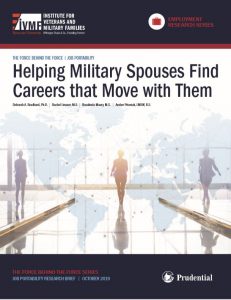
Authors:
- Deborah A. Bradbard, Ph.D.
- Rachel Linsner, M.S.
- Rosalinda Maury, M.S.
- Amber Pitoniak, LMSW, B.S.
Helping Military Spouses Find Careers that Move with Them focuses on job portability and what employers can do to not only recruit but also retain military spouse employees when they relocate. This study defines job portability, identifies gaps, and offers guidance to military spouses and potential employers. In collaboration with Prudential Financial, Inc. (NYSE:PRU), Helping Military Spouses Find Careers that Move with Them is #6 in a series of research products, focused on military spouse employment.
This Paper Explores
Relevant issues that apply to military spouse job portability
- Barriers to sustained employment related to relocation and job portability
- The essential role employers play in ensuring a workplace is “military spouse friendly”
- How employers can benefit from job portability by retaining talent
- Challenges that accompany the Status of Forces Agreements (SOFAs) when military spouses work overseas
Highlights and Findings
- Serial unemployment can have ripple effects on a military spouses’ career and their financial path including loss of benefits, seniority, or retirement savings.
- Without job portability, military spouses miss opportunities for sustained employment
- Portability helps spouses achieve career progression and financial security
- Nearly all spouses surveyed (97%) indicated they would take advantage of remote employment opportunities if they were offered by their current employer
- 71% of military spouses say they would take advantage of remote employment outside of the U.S. if it were offered
Key Recommendations
- Employers, policy makers, and military spouses should collaborate to identify gaps, remove barriers, and implement portability solutions
- Employers should work with their military spouse employees to customize portability solutions to their unique employment situation
- Employers can utilize and expand existing policies and resources (e.g., HR professionals, employee resource groups, and existing collaborative partnerships) to address job portability
- Employers, policy makers, and military spouses can work together to identify challenges associated with Status of Forces Agreements (SOFAs) when military spouses work overseas and develop guidance to assist military spouses and their employers
Below is a three-part suite of research, the IVMF along with Prudential released including case studies of military spouses that demonstrate some of the common employment difficulties they encounter, and training materials for hiring managers and human resource professions to use to learn more about recruiting and hiring them.
For more information about both Force Behind the Force series please visit: https://ivmf.syracuse.edu/research/topics/employment/military-spouse-employment-series/
